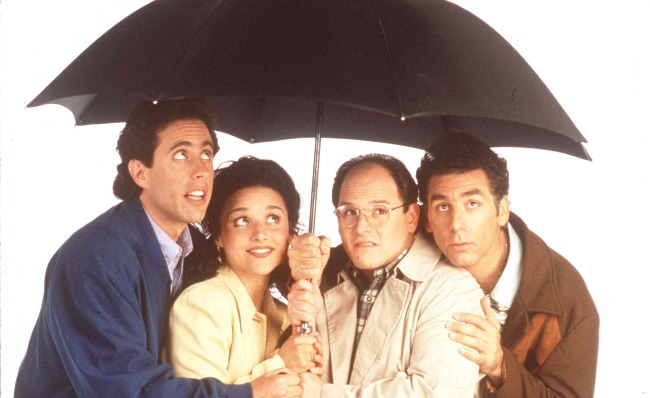
As you’ve no doubt heard, Mad Men‘s glorious run comes to a close on Sunday night, and David Letterman will retire from late night after 33 genre-altering years next week. Spring may be springing and bursting with new life, but those fast-approaching exits and the glut of season finales can turn a TV obsessive’s mind to endings… the good, the great, the not so much, and the terrible. And the Seinfeld finale — which aired 17 years ago today — falls into the latter category. Why? We’ve got a few ideas.
It Could Never Live Up To Our Impossible Expectations
Before I thwack the show’s creative choices, let’s give it a bit of a pass. Jerry Seinfeld and Larry David were facing an impossible task. Seinfeld had become, through its nine seasons, not just a popular TV show, but a part of our culture and our conversations. How “in our blood” was Seinfeld? Again, the finale aired 17 years ago, and we’re still talking about it, still praising it, still dissecting it, and still watching reruns while we now anxiously await its digital streaming arrival so we can go through it all again. Do you think we’ll be talking about The Big Bang Theory that long after its last Bazinga?
When it came time for the last Seinfeld episode, it felt like an event.
I remember seeing people getting ready to watch in large groups on the news while I was having a party of one as a friendless teenage comedy nerd, my favorite snacks gathered, the TV room all to myself, and a well-thumbed Entertainment Weekly salute to the show by my side. I expected to be blown away by the funniest episode of Seinfeld yet that night. I wanted to laugh away my disappointment over what I thought was, at the time, a premature end of this thing I loved. I doubt that I was alone in that, but, in hindsight, no one episode could have ever been enough.
It Was Too Busy
And now, the griping about the actual show.
NBC did a nice job with the clips retrospective before the show, but it almost felt like it continued into the series finale, thanks to the parade of guest stars and the remembrances of the gang’s “sins.” Also, an anti-clip show after a clip show and a teary Green Day-underwritten closing moment? You’re so punk rock.
Because They Apologized
Save for It’s Always Sunny in Philadelphia, everyone on television is too nice. That’s a grumpy complaint from what that solitary comedy nerd grew up to become, but I like what I like, and get off my lawn. Seinfeld was never nice. They were monstrous to each other and to the world around them, and it was charming because within us all beats the heart of a tyrant who would jack an old ladies marble rye, lie to our bosses, ceaselessly ridicule our friends, and judge everyone and everything in existence were it socially acceptable… unless I’m just an asshole out on a limb here. The point is, we liked the terrible things they did and the terrible people they were, and we watched them get lectured about that behavior and punished for what liked in a way that was completely unrelatable and clumsy. It felt like we were being judged by Seinfeld for liking Seinfeld. The anti-sitcom got a sitcom ending.
As we told you earlier, Matthew Weiner told the New York Times that essentially, he didn’t owe anyone anything in terms of offering up satisfying ends for the characters in Mad Men. And he has a point, but he goes on to say that the show has “held up [their] end of the bargain,” and I’m sure it will continue into the finale, and Weiner’s last Mad Men episode will feel like an episode of Mad Men. That wasn’t the case with the last episode of Seinfeld. What happened to the show about nothing? What happened to the second part of the show’s “no hugging, no learning” unofficial mantra? Jerry Seinfeld and Larry David got the ending they wanted for whatever reason they wanted it. In doing so, they failed to live up to their end of the bargain and gave us something self-referential and even self-hating. It was a weird note to go out on, but a good reminder that, while series finales matter a great deal, even the bad ones don’t have the power to destroy all the good that a show gives us.






